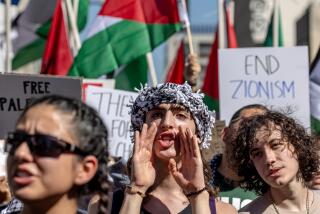Paris terrorist attacks shock Americans numbed by Mideast atrocities
There is a British prankster named Jack Jones who is trying to kick start a comedy career for himself by posting videos of his rude public encounters with unsuspecting people. One may or may not find Jones’ antics amusing, but he stepped way out of his shallow depth when he tweeted a serious message about last week’s brutal Islamic State attack in Lebanon in which 43 people were killed and 200 wounded.
“No media has covered this,” he said on Twitter, “but R.I.P. to all the the people that lost their lives in Lebanon yesterday from ISIS attacks.”
A British journalist, Martin Belam, was quick to call out Jones for his ignorance. With a search of Google News, Belam found 1,286 reports about the attack in Beirut, including stories on CNN and the BBC and in the New York Times, the Wall Street Journal, the Guardian, the Economist and the Daily Mail. The Los Angeles Times also ran a substantial story about the incident.
Despite the easily demonstrable falsehood of Jones’ comment, it got retweeted 50,000 times. Why? Perhaps because it played into a theme that has been spinning through social media in the days since the horrific Islamic State attacks in Paris — that the outpouring of grief, outrage and solidarity extended to the French people is proof that people in the West do not care about the similar plight of anyone in the world who is not like them.
Thinking along those lines, a reader in Seattle sent me an email decrying “a distinct racist bent” in media commentaries about the Paris attacks. To support his harsh indictment, the reader passed along couple of paragraphs from a New York Times story about a survivor of the violence in Syria:
“‘Imagine if what happened in Paris last night would happen there on a daily basis for five years,’ said Nour Kabbach, who fled the heavy bombardment of her home city of Aleppo, Syria, several years ago and now works in humanitarian aid in Beirut.
“‘Now imagine all that happening without global sympathy for innocent lost lives, with no special media updates by the minute, and without the support of every world leader condemning the violence,’ she wrote on Facebook. Finally, she said, ask yourself what it would be like to have to explain to your child why an attack in ‘another pretty city like yours’ got worldwide attention and your own did not.”
Those are challenging words. If I were an innocent victim of the terror in Syria, I, too, would feel abandoned by the world. But seeing racism in the response to the slaughter in the French capital misreads a natural human impulse.
The violence in Syria is appalling, but it is not easy for the average person to comprehend a three-sided conflict with thousands of victims and no obvious path to resolution. The terrible death and misery in the broader Middle East is tragic but appears so unrelenting and unresolvable that it is not unusual that most people are numbed to the perpetual bad news.
The Paris slaughter, on the other hand, is uniquely shocking because it is personal. Paris is a city beloved by millions of Americans and Europeans who have walked boulevards now stained by blood and sat in cafes like the ones whose windows are now riddled by bullet holes. The Islamic State attacks ruptured people’s warm nostalgia for a place that is not only a symbol of romance, but a symbol of enlightenment and liberty. Paris is the unofficial capital of Western civilization. It is not at all surprising that a vicious attack there evokes an emotional response of a magnitude far greater than the reaction to horrible events in other places.
It would be a noble thing for each of us to feel the same grief for every victim of every atrocity in the world, but none of us is wired that way. To care so much about a city that claims a special place in one’s heart and heritage is not racism, it is human nature.
More to Read
A cure for the common opinion
Get thought-provoking perspectives with our weekly newsletter.
You may occasionally receive promotional content from the Los Angeles Times.







